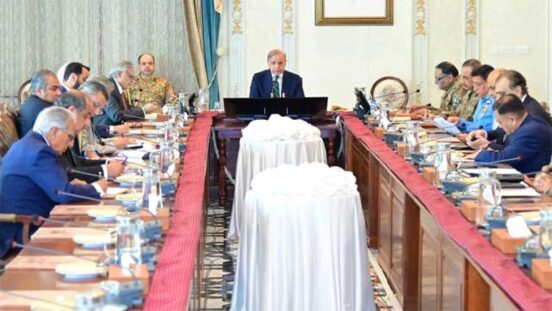ISLAMABAD -UNS: The National Security Committee (NSC) on Thursday decided to give India a fitting response and take up belligerence with international forums.
The decision has been taken a day after India announced revocation of the Indus Waters Treaty, downgrading diplomatic relations and closure of Attari passage.
According to sources, the NSC also rejected all Indian allegations against Pakistan in the wake of Pahalgam attack.
The meeting approved the recommendations of the Ministry of Foreign Affairs and pledged to give a strong response to Indian diplomatic and water aggression.
The meeting expressed satisfaction over the operational preparedness of the armed forces.
The NSC decided to close Wagah Border with immediate effect and says Pakistan reserves the right to suspend all bilateral agreements, including Simla Pact (signed in 1972).
The NSC expressed sorrow over the loss of lives in a terrorist attack in India-occupied Kashmir’s Pahalgam area.
Read also: Pakistan announces closure of Wagah Border, severing trade ties with India
The meeting, chaired by Prime Minister Shehbaz Sharif, was attended by the three services chiefs, Deputy Prime Minister Ishaq Dar, Defence Minister Khawaja Asif, Interior Minister Mohsin Naqvi, Information Minister Attaullah Tarar, Law Minister Azam Nazeer Tarar, Attorney General Mansoor Usman Awan, Special Assistant to the Prime Minister on Foreign Affairs Tariq Fatemi and senior civil officers.
Twenty-seven people were killed and 17 injured when suspected militants opened fire at tourists in India’s Jammu and Kashmir territory Pahalgam. This is said to be the worst such attack in the country in nearly two decades.
The ghastly incident triggered blame game between Pakistan and India.
Following a cabinet meeting chaired by Indian Prime Minister Narendra Modi on Wednesday, India announced the suspension of the Indus Waters Treaty with Pakistan, closure of Attari check post and other measures.
Later, Pakistan’s leaders decided to have a high-level meeting to be chaired by Prime Minister Shehbaz Sharif to come up with an effective response to India’s belligerence.
On Wednesday, Defence Minister Khawaja Asif said in a statement that a “session of the National Security Committee will be held under the chair of Prime Minister Shehbaz Sharif.”
INDIA’S RESPONSE TO MASSACRE
The Indian cabinet announced the suspension of the Indus Waters Treaty with Pakistan and the closure of the Attari check post in the aftermath of the attack.
At a press conference, the Indian Ministry of External Affairs also declared the cancellation of all visas issued to Pakistani nationals, instructing those currently in India to leave the country within 48 hours.
India has also suspended visas issued under the SAARC framework for Pakistani citizens.
A spokesperson said the Indian nationals residing in Pakistan must return via the Attari border crossing by May 1.
India has declared all military, naval, and air advisers in the Pakistani High Commission as “persona non grata” and recalled its own defence attaché from Pakistan.
The entire staff of Pakistan’s High Commission in India has been given seven days to return to Pakistan. Furthermore, India has announced a reduction in its diplomatic staff in Pakistan from 55 to 30 by May 1.
PAKISTAN’S CONCERNS
Pakistan expressed deep concern over the attack in the Pahalgam area of the occupied Jammu and Kashmir (IIOJK) which claimed the lives of 27 people and left 17 injured.
Foreign Office spokesperson Shafqat Ali Khan said in a statement on Wednesday that Pakistan was “saddened by the incident and expressed sympathy with the families of the deceased.”
He said: “We extend our condolences to the near ones of the deceased and wish the injured a speedy recovery.”
The spokesperson added that “we are concerned at the loss of tourists’ lives in an attack in Anantnag district of Indian Illegally Occupied Jammu and Kashmir.”
ANALYSTS BERATE INDIA FOR SPEWING HATE
Defence analysts and leaders in Pakistan said India kept alive its tradition of levelling baseless allegations against Pakistan.
They said its propaganda machinery started churning out accusations of Islamabad’s involvement in the occupied Kashmir incident.
The Indian media, they said, had been using such attacks without evidence to fuel anti-Pakistan sentiments. In reality, these accusations are often pre-meditated and used to spew venom against Pakistan.
Terrorism has no religion, but India consistently tries to associate it with Muslims and Pakistan.
The Indian social media accounts started tweeting with the hashtag #PakSponsoredTerror, within 30 minutes of the Pahalgam attack. Moreover, BJP leaders JP Nadda and Amit Shah posted tweets about the incident within half an hour after the incident, sources said.
WHAT HAPPENED IN PAHALGAM?
As many as 27 people were killed and 17 were injured when suspected militants opened fire at tourists in Pahalgam.
The attack took place on Tuesday in the popular destination of Pahalgam in the scenic Muslim-majority territory, that has seen a resurgence in mass tourism as insurgent violence waned in recent years.
The attack occurred in an off-the-road meadow and the dead included 25 Indians and one Nepalese national, police said.
It was the worst attack on civilians in India since the 2008 Mumbai shootings in which more than 160 people were killed.
On Wednesday, over a dozen local organisations called for a shutdown in the federal territory to protest against the attack on tourists, whose rising numbers have helped the local economy.
Many schools also suspended classes for the day in protest.
Airlines were operating extra flights from Srinagar, the summer capital of the territory, as visitors were rushing out of the region, officials said.




